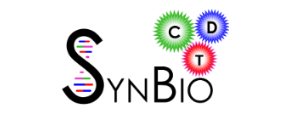Doctoral training
BrisSynBio is proud to welcome the next generation of synthetic biologists. We work with the EPSRC & BBSRC Centre for Doctoral Training in Synthetic Biology (SynBioCDT) and the DSTL SynBio/Materials group, providing Bristol-based PhD students with unfettered access to all of BrisSynBio's facilities.
SynBioCDT and DSTL SynBio/Materials students are full members of the BrisSynBio community, and encouraged to join in with all BrisSynBio events.
EPSRC & BBSRC Centre for Doctoral Training in Synthetic Biology (SynBioCDT)
The SynBioCDT is a 4-year doctoral programme, run as a collaboration between the Universities of Oxford, Bristol and Warwick. It provides a training that combines the fundamental understanding of biological systems with the principles of engineering, so as to create the next generation of industrial and academic leaders in the nascent field of Synthetic Biology.
The CDT focuses on the design and engineering of biologically based parts, novel devices and systems as well as the re-design of existing, natural biological systems across all scales from molecules to organisms. Each year Bristol welcomes a new cohort of PhD students.
Applications:
The Synthetic Biology CDT programme is currently under renewal. Please contact us at synbio-cdt@bristol.ac.uk to express an interest in applying for 2019 entry. You will be contacted as and when results are known.
CDT 2017 intake:
- Georgia Oakley – "Protein design in a cell: towards Synthetic proteomes"
- Sam Johns - "Simulation-led design and evaluation of novel Diels-Alderases for use in industry"
- George Klemperer - "3D Bioprinted Self-Polymerising Bacterial Bioreactors"
- Julien Capin - "SynBac: Synthetic Baculovirus for Next Generation Gene Therapy"
- Henry Stennett - "Antibiotics from the Abyss"
CDT 2016 intake:
- Emma Magill - "Engineering new DNA recognition elements using HsdS subunit from type I restriction endonucleases"
- Vittorio Bartoli - "Development of an integrated synthetic biology/chemical engineering design pipeline"
- Daniel Dixon - "Improving the robustness of genetic circuits"
- Laurence Maschio - "Reengineering the Abyssomycin pathway to produce novel, functional biomolecules"
- Jack Steventon - "Reengineering the Abyssomycin pathway to produce novel, functional biomolecules"
CDT 2015 intake:
- Caitlin Edgell – “Designed components for transcriptional control in cells”
- Luke Cartlidge – “Inducing recombination in plants using genome editing techniques”
- Joseph Hawksworth – “Bioengineering red blood cells using gene editing techniques”
- Juntai Liu – “Coiled-coil directed photosynthetic protein self-assemblies and programmable nano-reactor systems”
Defence Science and Technology Laboratory (DSTL)
The DSTL has funded four projects as part of a call for "Synthetic Biology to Produce Novel Materials for Defence and Security". These are being supervised via a collaboration between BrisSynBio, the Advanced Composites Centre for Innovation and Science (ACCIS) and the Bristol Centre for Functional Nanomaterials (BCFN).
DSTL SynBio/Materials Intake
- Bethany Hickton - "Bioprinting for creating and growing ceramic armour on-demand"
- Carl Marsh - "De novo biosynthetic pathways for the production of furan based self-healing materials"
- Graham Day - "Re-engineering the phase behaviour of enzymes: synthetic supercharged enzyme-polymer surfactant constructs for organophosphate decontamination"
- Ioannis Zampetakis - "Meta-compliance and energy dissipation in cactus-based solids"
 SynBioCDT
SynBioCDT
The EPSRC & BBSRC Centre for Doctoral Training in Synthetic Biology (SynBioCDT) 4-year doctoral programme, a collaboration between the Universities of Oxford, Bristol and Warwick.